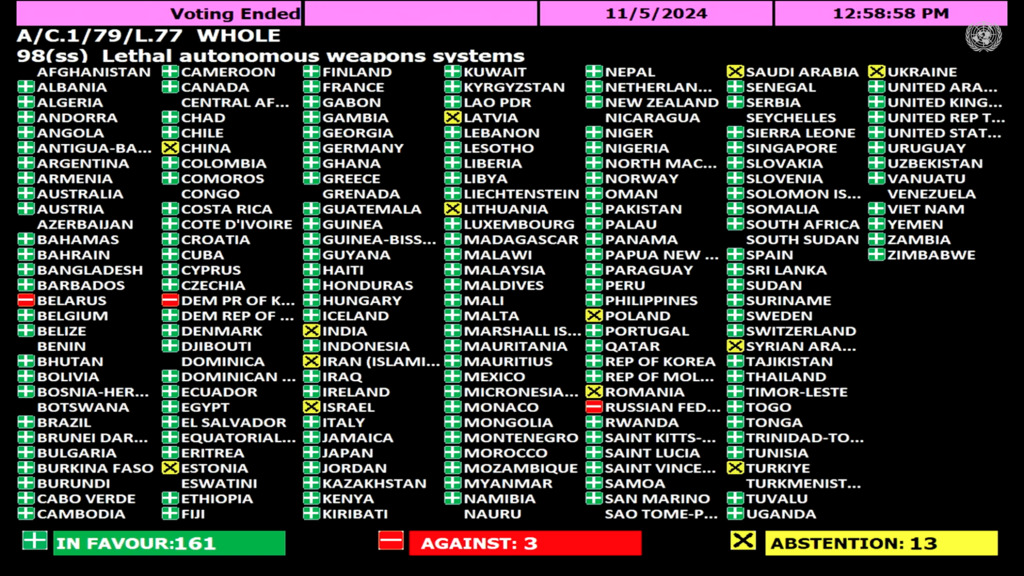
161 states vote against the machine at the UN General Assembly
Resounding support for the second UNGA resolution on autonomous weapons expands discussions in 2025, mandating talks in New York including all states for the first time.
On 5 November 2024, the First Committee of the UN General Assembly adopted a resolution on autonomous weapons systems for the second year running, mindful of the “serious challenges and concerns that new and emerging technological applications in the military domain, including those related to artificial intelligence and autonomy in weapons systems, [raise] from humanitarian, legal, security, technological and ethical perspectives.”
The voting result on Resolution L.77 was 161 states in favour and 3 against, with 13 abstentions.
A small step forward towards the much needed treaty on autonomous weapons systems, the resolution mandates expanded discussions and supports capacity building on the autonomous weapons topic, and will provide a platform for comprehensive and inclusive consideration of the issues raised in the report of the Secretary-General on autonomous weapons systems. These talks in 2025 will give an opportunity to examine issues that aren’t the main focus of current CCW talks – such as ethics and human rights – which states can and must use to build strong foundations for treaty negotiations that respond comprehensively to the problem of autonomous weapons.
Tabled by Austria and a group of 26 co-sponsoring states,* the resolution raises concerns about the “negative consequences and impact of autonomous weapon systems on global security and regional and international stability, including the risk of an emerging arms race, of exacerbating existing conflicts and humanitarian crises, miscalculations, lowering the threshold for and escalation of conflicts and proliferation, including to unauthorised recipients and non-State actors” and stresses the “the importance of the role of humans in the use of force to ensure responsibility and accountability and for States to comply with international law.” It also notes “the repeated calls by the Secretary-General to urgently conclude negotiations of a legally binding instrument with prohibitions and regulations for autonomous weapons systems, in line with a two-tier approach.”
It is extremely disappointing that this resolution does not reflect the clear desire of the majority of the international community to urgently launch negotiations on a legally binding instrument on autonomous weapons systems. Since the UNGA last year, reports of Israel’s use of wider military AI tools in Gaza have shown the devastating and unacceptable harm that can result from seeking to increase the speed of violence through AI and automation, entailing the erosion of meaningful human control and decision-making in the use of force, and the reduction of people to data points. The national weapons development programmes of other states, such as the US and Russia, continue to show that countries are already looking to compete for military advantage through increasing autonomy in weapons systems. With this resolution, states had the opportunity, and failed, to respond to the urgency to protect civilians that is demanded by developments in current conflicts and clearly demonstrate commitment to pursuing the development of new international law on autonomous weapons.
Unfortunately, the ambition of this year’s resolution was successfully curtailed by a small number of highly-militarised states that demanded changes to the resolution to significantly reduce the scope of the resolution. This demonstrates why it is so critical that autonomous weapons systems are discussed in a forum that is accessible to all and blockable by none.
As adopted, this year’s resolution is a modest approach which builds on the 2023 Resolution 78/241 and the joint statement on autonomous weapons delivered by 70 states in 2022. The main sponsors of the resolution clearly took lengths to draft the resolution as complementary and supportive of the current mandate of the Convention on Conventional Weapons (CCW) Group of Governmental Experts on lethal autonomous weapons systems (GGE LAWS).
The resolution results in the convening of open informal consultations in 2025 over two days in New York, “to consider the report of the Secretary-General in full complementarity with and in a manner that supports the fulfilment of the mandate of the Group of Governmental Experts in order to further the international community’s understanding of the issues involved by discussing the full range of views received, including proposals and relevant aspects raised in the report that may thus far not have been discussed in detail in the Group of Governmental Experts.” The consultations will be open to the participation of all UN member states and observer states, international and regional organisations, the International Committee of the Red Cross, and civil society, including the scientific community and industry.
Stop Killer Robots stands ready to support states committed to preventing the automation of killing and digital dehumanisation, and looks forward to participating in the informal consultations in 2025.
*Co-sponsoring states: Antigua and Barbuda, Austria, Belgium, Brazil, Costa Rica, Croatia, Cyprus, Dominican Republic, Ecuador, Guatemala, Honduras, Ireland, Kiribati, Liechtenstein, Malawi, Malta, Mexico, New Zealand, Norway, Philippines, Republic of Moldova, San Marino, Sierra Leone, Sri Lanka, State of Palestine, Switzerland, Trinidad and Tobago



